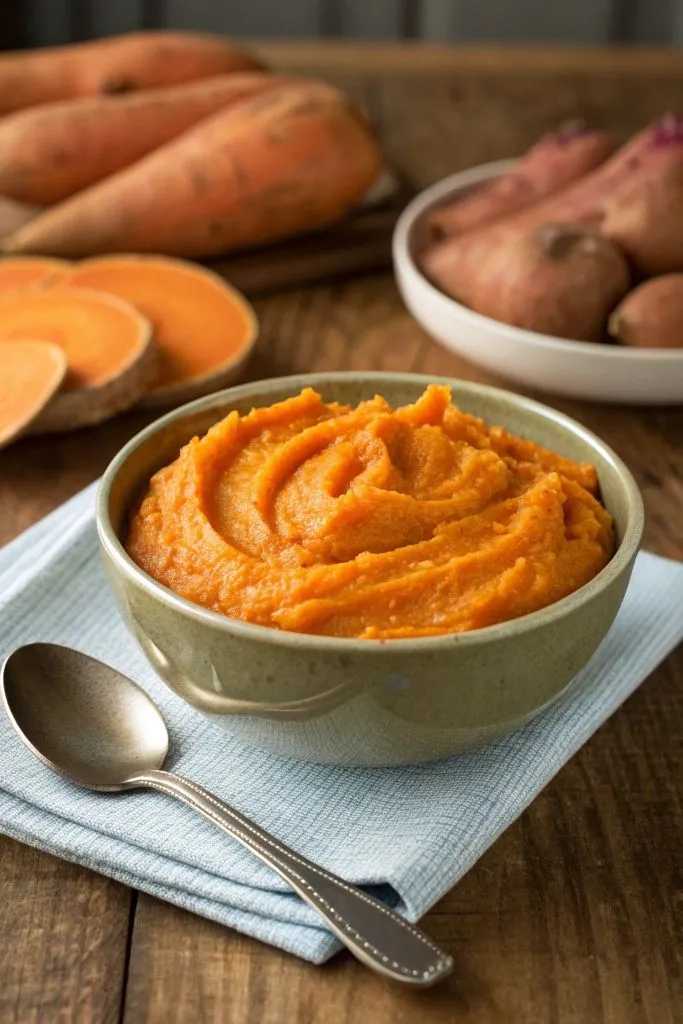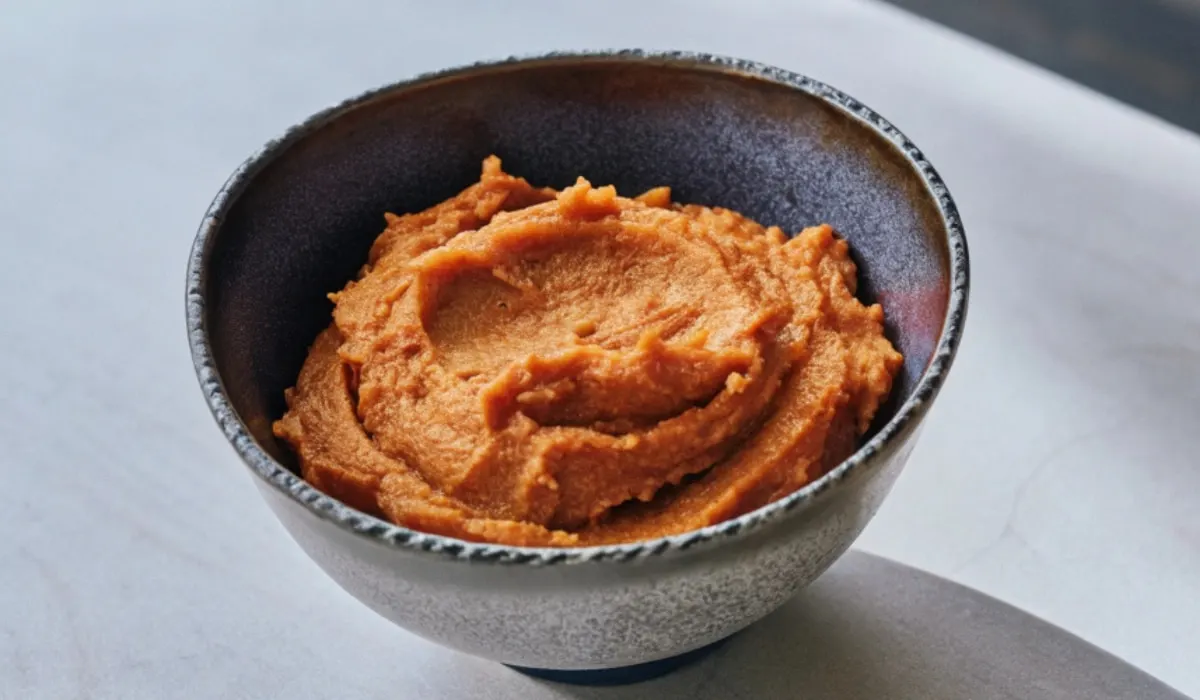Have you ever craved a dish that’s both comforting and nutritious, yet incredibly easy to make? Say hello to sweet potato puree—a velvety, versatile delight that’s perfect for any occasion. Whether you’re whipping up a quick side dish for Thanksgiving, preparing a wholesome baby food, or experimenting with new recipes like sweet potato cookies or sweet potato soup, this puree is your go-to base.
Packed with vitamins, fiber, and natural sweetness, it’s a crowd-pleaser for kids and adults alike. Plus, it’s gluten-free, vegan-friendly, and endlessly customizable. Want to keep it simple with cinnamon and vanilla, or add a savory twist with herbs and spices? The choice is yours!
So, are you ready to transform humble sweet potatoes into a dish that’s as nourishing as it is delicious? Let’s roll up our sleeves and whip up something truly unforgettable.
Table of Contents
Key Benefits of Sweet Potato Puree
Sweet potato puree isn’t just a dish—it’s a powerhouse of nutrition and versatility. Whether you’re a busy parent, a health-conscious foodie, or someone looking for a simple yet impressive side dish, this recipe has something for everyone. Here’s why you’ll love it:
- Nutrient-Rich Goodness: Sweet potatoes are packed with vitamin A, which supports eye health, and vitamin C, known for boosting immunity. They’re also high in fiber, making them great for digestion and keeping you full longer.
- Naturally Sweet Flavor: The natural sweetness of sweet potatoes means you can enjoy a delicious dish without added sugars. It’s perfect for satisfying cravings in a healthy way.
- Dietary Flexibility: This recipe is gluten-free and can easily be made vegan by using plant-based butter and milk. It’s a dish that everyone can enjoy, no matter their dietary needs or preferences.
- Endless Versatility: Use it as a side dish, baby food, or even as a base for other recipes like sweet potato soup, cookies, or cakes.
Why You’ll Keep Coming Back to This Recipe
- Quick and Easy: With just a handful of ingredients and simple steps, this puree is perfect for busy weeknights or last-minute meal prep.
- Kid-Friendly: Its smooth texture and sweet flavor make it a hit with little ones, whether as a standalone dish or mixed into other foods.
- Meal Prep Star: Make a big batch ahead of time—it stores beautifully in the fridge or freezer, ready to elevate any meal.
So, whether you’re serving it at a holiday dinner, packing it for lunch, or using it as a secret ingredient in baked goods, sweet potato puree is a recipe you’ll turn to again and again. Ready to get started? Let’s move on to the ingredients!
Ingredients for Sweet Potato Puree
Creating a velvety-sweet potato puree starts with simple, wholesome ingredients. Here’s everything you’ll need to make this delicious dish:

- 2 lbs (about 4 medium) sweet potatoes – Look for firm, unblemished sweet potatoes with smooth skin.
- 2 tbsp unsalted butter – For a rich, creamy texture. Use vegan butter if you prefer a dairy-free option.
- 1/4 cup milk – Whole milk works best, but you can substitute with almond, oat, or coconut milk for a plant-based version.
- 1 tsp pure vanilla extract – Adds a hint of warmth and sweetness. Optional, but highly recommended!
- 1/2 tsp ground cinnamon – For a cozy, spiced flavor. Nutmeg or pumpkin spice are great alternatives.
- Salt and pepper – Just a pinch to balance the flavors.
- 1-2 tbsp maple syrup or brown sugar – Optional, for a touch of extra sweetness.
Why These Ingredients Work
- Sweet Potatoes: The star of the show, packed with natural sweetness and nutrients.
- Butter and Milk: These create the creamy, luxurious texture that makes this puree irresistible.
- Spices and Sweeteners: Cinnamon and vanilla elevate the flavor, while maple syrup or brown sugar adds a subtle caramel-like depth.
Pro Tips for Ingredient Prep
- Choose the Right Sweet Potatoes: Opt for orange-fleshed varieties like Beauregard or Jewel for the sweetest, most vibrant puree.
- Room Temperature Butter: Softened butter blends more easily, ensuring a smoother consistency.
- Adjust to Taste: Feel free to tweak the sweetness or spice levels to suit your preferences.
With these ingredients on hand, you’re just a few steps away from a dish that’s as nourishing as it is delicious. Ready to cook? Let’s move on to the instructions!
How to Make Sweet Potato Puree Step-by-Step
Ready to transform sweet potatoes into a silky-smooth puree? Follow these easy steps, and you’ll have a dish that’s as effortless as it is impressive.

Step 1: Prepare the Sweet Potatoes
- Carefully remove the skin from the sweet potatoes by using a vegetable peeler.
- Cut them into 1-inch cubes. This helps to ensure that the sweet potatoes cook uniformly and efficiently.
Pro Tip: If you’re short on time, you can microwave the sweet potatoes whole for 5-7 minutes to soften them before peeling and cubing.
Step 2: Cook the Sweet Potatoes
- Option 1: Boiling
- Transfer the diced sweet potatoes into a spacious saucepan and submerge them in water.
- Heat the mixture until it reaches a rolling boil, then lower the temperature and allow it to gently simmer for approximately 15 to 20 minutes, or until it becomes Soft enough to be effortlessly pierced with a fork.
- Drain well to avoid a watery puree.
- Option 2: Roasting
- Preheat your oven to 400°F (200°C).
- Toss the sweet potato cubes with 1 tbsp olive oil and spread them on a baking sheet.
- Bake for 25-30 minutes, turning halfway through, until soft and lightly caramelized.
Why Roast? Roasting deepens the flavor, giving your puree a richer, more complex taste.
Step 3: Blend or Mash
- Move the cooked sweet potatoes into a blender or food processor.
- Add the butter, milk, vanilla extract, cinnamon, salt, and pepper.
- Blend until smooth and creamy.
No Blender? Use a potato masher or fork for a chunkier texture—it’s just as delicious!
Step 4: Adjust Consistency and Flavor
- If the puree is too thick, add more milk, 1 tbsp at a time, until you reach your desired consistency.
- Taste and adjust sweetness with maple syrup or brown sugar if needed.
Step 5: Serve and Enjoy
- Place the puree into a serving bowl.
- Garnish with a sprinkle of cinnamon, a drizzle of maple syrup, or a pat of butter for extra richness.
Why These Steps Work
- Cooking Methods: Boiling is quick and easy, while roasting adds depth of flavor. Pick according to your available time and flavor preferences.
- Blending Tips: A blender ensures a silky texture, but a masher works if you prefer a rustic feel.
- Customization: Adjusting the consistency and sweetness makes this recipe adaptable to any palate.
With these steps, you’ll have a perfect sweet potato puree every time. Now, let’s explore some pro tips and variations to make it even more exciting!
Pro Tips and Variations for Sweet Potato Puree
Now that you’ve got the basics down, let’s take your sweet potato puree to the next level with some expert tips and creative variations. Whether you’re looking to switch up the flavor or make the process even easier, these ideas will inspire you to get creative in the kitchen.

Pro Tips for Perfect Puree
- Choose the Right Sweet Potatoes: Opt for orange-fleshed varieties like Beauregard or Jewel for the sweetest, most vibrant puree.
- Roast for Richer Flavor: If you have time, roasting the sweet potatoes instead of boiling them adds a caramelized depth that’s irresistible.
- Blend While Warm: For the smoothest texture, blend the sweet potatoes while they’re still warm. Cold potatoes can make the puree grainy.
- Freeze for Later: Portion the puree into airtight containers or freezer bags and store for up to 3 months. Let it thaw in the refrigerator overnight, then warm it up slowly on the stovetop or in the microwave.
Flavor Variations
- Savory Twist: Skip the cinnamon and vanilla. Add a pinch of garlic powder, smoked paprika, or fresh herbs like rosemary or thyme for a savory version.
- Spicy Kick: Stir in a dash of cayenne pepper or chili powder for a subtle heat that pairs well with grilled meats.
- Decadent Dessert: Mix in a tablespoon of brown sugar, a splash of cream, and a handful of mini marshmallows for a dessert-like treat. Broil for 2-3 minutes to toast the marshmallows.
Dietary Adaptations
- Vegan Option: Use plant-based butter and milk (like almond, oat, or coconut) for a dairy-free version.
- Low-Sugar Version: Skip the maple syrup or brown sugar and let the natural sweetness of the potatoes shine.
- Nut-Free Topping: Instead of nuts, sprinkle with seeds like pumpkin or sunflower for a crunchy finish.
Creative Uses for Leftovers
- Sweet Potato Pancakes: Mix the puree into pancake batter for fluffy, flavorful pancakes.
- Soup Base: Thin the puree with vegetable broth, add a splash of cream, and heat for a quick and comforting soup.
- Baking Secret: Use it as a moistening agent in muffins, cookies, or cakes.
Why These Tips and Variations Work
- Customization: These ideas let you tailor the puree to your taste preferences and dietary needs.
- Efficiency: Tips like freezing and roasting save time and enhance flavor.
- Versatility: From savory to sweet, this puree can adapt to any meal or occasion.
With these pro tips and variations, your sweet potato puree will never be boring. Get creative, enjoy the process, and make it uniquely yours! Now, let’s move on to some delicious serving suggestions.
Serving Suggestions for Sweet Potato Puree
Now that you’ve mastered the art of making sweet potato puree, let’s talk about how to serve it in ways that will wow your family and guests. This versatile dish can shine in so many settings—here are some creative and delicious ideas to get you started:
1. As a Side Dish
- Holiday Dinners: Pair it with roasted turkey, ham, or baked chicken for a festive touch. It’s a more nutritious option compared to traditional mashed potatoes.
- Weeknight Meals: Serve alongside grilled salmon, roasted vegetables, or a juicy steak for a quick, nutritious dinner.
2. For Breakfast or Brunch
- Sweet Potato Toast: Spread the puree on whole-grain toast and top with almond butter, sliced bananas, and a drizzle of honey.
- Pancake or Waffle Topping: Use it as a flavorful and colorful topping instead of syrup.
3. As a Base for Other Recipes
- Sweet Potato Soup: Thin the puree with vegetable broth, add a splash of cream, and heat for a comforting soup.
- Baking: Use it as an ingredient in muffins, cookies, or cakes for added moisture and natural sweetness.
4. For Babies and Toddlers
- Baby Food: Serve it plain or mixed with a bit of applesauce for a gentle introduction to solid foods.
- Toddler Meals: Stir it into oatmeal, yogurt, or pasta for a nutrient-packed boost.
5. Creative Toppings and Mix-Ins
- Sweet Toppings: Add a sprinkle of cinnamon, chopped nuts, or a drizzle of maple syrup for a dessert-like treat.
- Savory Twists: Stir in fresh herbs like rosemary or thyme, or top with crispy bacon bits for a flavorful contrast.
Why These Serving Ideas Work
- Versatility: Sweet potato puree pairs well with both sweet and savory dishes, making it a year-round favorite.
- Nutritional Boost: It adds vitamins, fiber, and natural sweetness to any meal.
- Kid-Friendly: Its smooth texture and mild flavor make it a hit with little ones.
Pro Tip: Make It Ahead
- Sweet potato puree stores beautifully in the fridge for up to 5 days or in the freezer for up to 3 months. Warm it up slowly on the stovetop or in the microwave, stirring in a little milk to bring back its smooth, creamy consistency.
Whether you’re serving it at a holiday feast, packing it for lunch, or using it as a secret ingredient in baked goods, sweet potato puree is a dish that’s as practical as it is delicious. Now, let’s wrap things up with a few final thoughts and FAQs!
________________________________________________________________

Sweet Potato Puree
Ingredients
- 2 lbs about 4 medium sweet potatoes, peeled and cubed
- 2 tbsp unsalted butter or vegan butter
- ¼ cup milk or plant-based milk
- 1 tsp pure vanilla extract optional
- ½ tsp ground cinnamon
- Salt and pepper to taste
- 1-2 tbsp maple syrup or brown sugar optional
Instructions
- Prepare the Sweet Potatoes: Peel and cube the sweet potatoes into 1-inch pieces.
- Cook: Boil for 15-20 minutes or roast at 400°F (200°C) for 25-30 minutes until tender.
- Blend: Transfer cooked sweet potatoes to a blender. Add butter, milk, vanilla, cinnamon, salt, and pepper. Blend until smooth.
- Adjust: Add more milk for desired consistency and sweeten with maple syrup if needed.
- Serve: Garnish with cinnamon or a drizzle of maple syrup.
Pro Tips
- Roast for Flavor: Roasting sweet potatoes adds a caramelized depth.
- Freeze for Later: Store in airtight containers for up to 3 months.
- Customize: Add herbs for a savory twist or marshmallows for a sweet treat.
Notes
- Calories: 120 kcal
- Fat: 4g
- Saturated Fat: 2.5g
- Protein: 2g
- Carbohydrates: 20g
- Fiber: 3g
- Sugar: 7g (natural)
- Sodium: 80mg
- Vitamin A: 200% DV
- Vitamin C: 20% DV
Conclusion: Why Sweet Potato Puree Deserves a Spot in Your Kitchen
Sweet potato puree is more than just a recipe—it’s a kitchen essential that combines simplicity, versatility, and nutrition in one delicious dish. Whether you’re serving it as a comforting side, a base for creative recipes, or a wholesome baby food, its creamy texture and rich flavor make it a standout addition to any meal.
Packed with vitamins, fiber, and natural sweetness, it’s a dish that caters to almost any dietary need, from gluten-free to vegan. Plus, it’s incredibly easy to customize, allowing you to tweak the flavors and consistency to suit your taste.
So, why not give it a try? With its endless possibilities and health benefits, sweet potato puree is sure to become a favorite in your kitchen. Happy cooking!
FAQS
Is Sweet Potato Puree Good for You?
Absolutely! Sweet potato puree is a nutritional powerhouse, packed with vitamin A for eye health, vitamin C for immunity, and fiber for digestion. It’s naturally gluten-free, low in calories, and can easily be made vegan, making it a healthy choice for almost any diet.
Are Mashed Sweet Potatoes Good?
Yes, mashed sweet potatoes are not only delicious but also incredibly nutritious. They’re rich in vitamins, minerals, and antioxidants, and their natural sweetness makes them a hit with both kids and adults. Plus, they’re versatile—perfect for holiday dinners, weeknight meals, or even baby food.
How to Make Perfect Potato Puree ?
For the perfect potato puree, start with starchy potatoes like Yukon Gold or Russet. Cook them until tender, then mash or blend with butter, warm milk, and a pinch of salt until smooth and creamy. The key is to avoid overworking the potatoes, which can make them gluey.
Which Potatoes Are Best for Puree?
For the creamiest puree, opt for starchy potatoes like Yukon Gold or Russet. Their high starch content and low moisture make them ideal for achieving a smooth, velvety texture. Sweet potatoes are also a great choice, offering a naturally sweet and nutrient-rich alternative.

